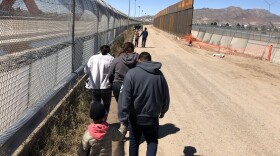State lawmakers on Thursday will consider and possibly advance several controversial border security and immigration proposals as the upper chamber continues its quick work on passing some of Gov. Greg Abbott’s priority items.
The measures, which are all authored by Republicans, include: legislation to create a new state offense for entering Texas illegally; a bill to create an information and resource sharing compact between border states; a proposal to increase the penalties for human smuggling; and a proposal for a resolution that would reaffirm Texas’ ability to declare an “invasion” and urge the federal government to designate Mexican cartels as terrorist organizations.
Senate bill 2424, authored by state Sen. Brian Birdwell, R-Granbury, would authorize state law enforcement officers from across Texas to arrest and prosecute a person who crosses the border illegally. The penalties would be a class A misdemeanor for a first offense and increase to a felony if the person was previously convicted. Under current law, local law enforcement agencies cannot prohibit their officers from asking a person who is arrested or detained their immigration status.
It’s unclear what probable cause an officer would need to make the arrest under Birdwell’s proposal.
Birdwell has also authored Senate bill 600, which would increase the penalty for a person convicted of human smuggling to a minimum five-year sentence instead of the current two-year minimum. According to SB 600’s bill analysis, trafficking organizations that smuggle people across the border make $13 billion annually.
Also on the schedule is Senate bill 1403, by state Sen. Tan Parker, R-Flower Mound, which would authorize the governor’s office to enter into a border compact with other states “to share resources and intelligence for purposes of border enforcement and allow states to share funding and other assistance in creating and maintaining defensive border structures,” according to the bill’s analysis. Text of the proposal also makes clear that the effort would not need approval from Congress because it does “does not alter the balance of power between states and the federal government.”
If passed, the legislation would likely add to the state’s current efforts to build barriers on Texas’ southern border. Abbott announced in 2021 the state would undertake the effort after the Biden administration paused construction of most new barriers after he took office.
Abbott has launched a fundraiser on his state website to raise money for border wall construction and as of late February, it’s gathered $55 million. Abbott also announced in January the appointment of the state’s first-ever “border czar” whose list of duties includes working with state law enforcement and the Texas National Guard on the construction of more barriers.
The Senate committee will also hear about a proposed resolution by state Sen. Lois Kolkhorst, R-Brenham, that would urge the Biden administration to declare foreign cartels “terrorist” organizations. The designation push has also garnered some support from Texas Democrats.
Earlier this month U.S. Rep. Vicente Gonzalez, D-McAllen, said it was time “we start treating cartels as terrorist organizations and work with the Mexican government, who is our closest and biggest trading partner, to dismantle cartels,” according to the Border Report.
But the Washington Office on Latin America said the label could ensnare asylum seekers and even some U.S. citizens. According to the WOLA analysis, it is currently a crime to provide “material support” or engage in financial transactions to groups on the list of foreign terrorist organizations.
“Adding Mexican criminal groups to the FTO list could leave U.S. citizens who purchase drugs from these groups, or who help them to launder money, facing terrorism charges,” wrote WOLA’s Adam Isacson. “The same could apply to corrupt foreign government and security personnel on these groups’ payroll. Asylum seekers could also be barred from the United States if found ever to have made payments to groups considered “terrorist”—including payments made under duress like extortion or ransoms.”
The committee could also revisit Birdwell’s SB 602, which was heard in committee last week. That proposal would allow U.S. Border Patrol agents to arrest, detain and search people suspected of violating state laws.
“The limitation on where Border Patrol can detain individuals means that they cannot detain a person suspected of committing a state felony when they are on patrol along the border,” Birdwell said last week.
The bill was left pending after some lawmakers raised concerns over whether Border Patrol agents would be overworked if they also pursued people accused of committing misdemeanors. Birdwell took the concerns under advisement and said he would possibly amend the bill later.
KERA News is made possible through the generosity of our members. If you find this reporting valuable, consider making a tax-deductible gift today. Thank you.
Got a tip? Email Julián Aguilar at jaguilar@kera.org.You can follow Julián on Twitter @nachoaguilar.


